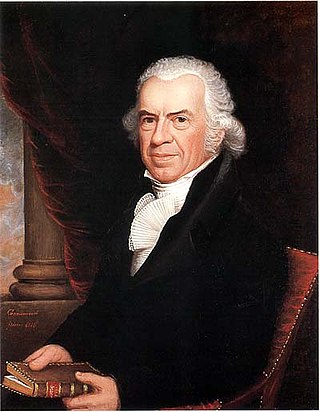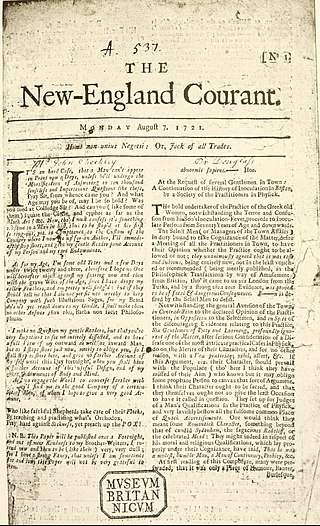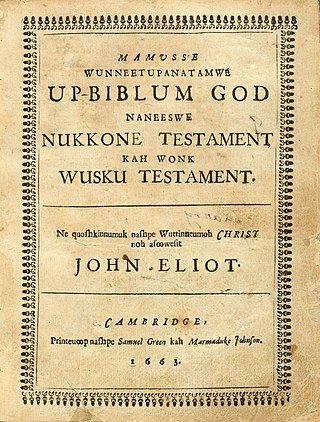
Isaiah Thomas was an early American printer, newspaper publisher and author. He performed the first public reading of the Declaration of Independence in Worcester, Massachusetts, and reported the first account of the Battles of Lexington and Concord. He was the founder of the American Antiquarian Society.

The Club of Odd Volumes is a private social club and society of bibliophiles founded in 1887, in Boston, Massachusetts, USA.

The New-England Courant, one of the first American newspapers, was founded in Boston in 1721, by James Franklin. It was a weekly newspaper and the third to appear in Boston. Unlike other newspapers, it offered a more critical account about the British colonial government and other royal figures of authority. The newspaper published critical commentary about smallpox inoculation which fueled the controversy during the smallpox epidemic in Boston. Ultimately it was suppressed in 1726 by British colonial authorities for printing what they considered seditious articles. Franklin took on his brother, Benjamin Franklin, as an apprentice and at one point was compelled to sign over publication of the Courant to him to avert further prosecution. Benjamin submitted anonymous editorials to the Courant, which resulted in James' imprisonment after he began publishing them. This sort of Governmental censorship of early colonial newspapers is what largely fostered the American ideal of Freedom of Speech in the press. The New England Courant is widely noted among historians as being the first newspaper to publish Benjamin's writings.

Samuel Green was an early American printer, the first of several printers from the Green family who followed in his footsteps. One of Green's major accomplishments as a printer was the Eliot Indian Bible, translated by the missionary John Eliot, typeset by James Printer, which became the first Bible to be printed in British America in 1663. Members of his family who also became printers include his sons Bartholomew, Bartholomew Green Jr. and Joseph Dennie. Throughout his adult life Green also served in the Massachusetts Bay Colonial Militia, advancing to the rank of captain later in life.

Franklin Pierce Rice (1852–1919) was a self-taught printer and publisher who transcribed and printed and preserved vital records from Massachusetts and was a co-founder of the Worcester Society of Antiquity.
Samuel Gerrish was an American bookseller and publisher based in Boston during the 18th century. He kept a shop "near the brick meeting house in Cornhill," and published works by Thomas Prince and others. Employees included Thomas Hancock.

Samuel Kneeland (c.1696–1769) was an American printer and publisher of The Boston Gazette and Weekly Journal. Kneeland obtained much of his work printing laws and other official documents for the Province of Massachusetts Bay colonial government for about two decades. He printed the first Bible in the English language ever produced in the American colonies, along with many other religious and spiritual works, including the Book of Psalms. He was also noted for introducing a number of innovations to newspaper printing and journalism. He was one of many colonial printers who were strongly opposed to and outspoken against the Stamp Act in 1765. Kneeland, primarily, along with his sons, were responsible for printing the greater majority of books, magazines and pamphlets published in Boston during his lifetime.

John Foster was an early American engraver and printer who lived in Boston in the Massachusetts Bay Colony when the colony was still in its infancy. He is credited with producing the first printed image in British colonial America, from a woodcut of the Puritan minister Richard Mather. He also printed the first map to appear in the colonies. Foster graduated from Harvard University, but was a self-taught pioneer in American printmaking in woodcut, and also learned the art of typography from the Boston printer Marmaduke Johnson. He subsequently printed many works by prominent religious figures of the day in Massachusetts, and for a few years printed and published an annual almanac. His woodcuts were also used for the printing of official seals of the Massachusetts Bay Colony used by the provincial government.

Spiritual Milk for Boston Babes is a children's catechism by the minister John Cotton. The 1656 catechism is the first known children's book published in America.

Cockenoe was an early Native American translator from Long Island in New York where he was a member of the Montaukett. He helped to translate the earliest parts of the Eliot Indian Bible, the first Bible published in America.

Early American publishers and printers played a central role in the social, religious, political and commercial development of the Thirteen Colonies in British America prior to and during the American Revolution and the ensuing American Revolutionary War that established American independence.

Bibliography of early American publishers and printers is a selection of books, journals and other publications devoted to these topics covering their careers and other activities before, during and after the American Revolution. Various works that are not primarily devoted to those topics, but whose content devotes itself to them in significant measure, are sometimes included here also. Works about Benjamin Franklin, a famous printer and publisher, among other things, are too numerous to list in this bibliography, can be found at Bibliography of Benjamin Franklin, and are generally not included here unless they are intensely devoted to Franklin's printing career. Single accounts of printers and publishers that occur in encyclopedia articles are not included here.

This is a comprehensive list of primary and secondary works by or about Benjamin Franklin, one of the principal Founding Fathers of the United States. Works about Franklin have been consistently published during and after Franklin's life, spanning four centuries, and continue to appear in present-day publications. Scholarly works that are not necessarily subject-specific to Franklin, yet cover his life and efforts in significant measure, may also be included here. In contrast, this bibliography does not include the numerous encyclopedia articles and short essays about Franklin.
Samuel Hall (1740-1807), was an Early American publisher and printer, newspaper editor, and an ardent colonial American patriot from Bedford, Massachusetts who was active in this capacity before and during the American Revolution, often printing newspapers and pamphlets in support of American independence. Hall was the founder of The Essex Gazette, the first newspaper published in Salem, Massachusetts in 1768. He often employed his newspaper as a voice supporting colonial grievances over taxation and other actions by the British Parliament that were considered oppressive, and ultimately in support of American independence.
Marmaduke Johnson was a London printer who was commissioned and sailed from England to Massachusetts Bay Colony in 1660 to assist Samuel Green in the printing of The Indian Bible, which had been laboriously translated by John Eliot into the Massachusett Indian language, which became the first Bible printed in America. Johnson is considered the first master printer to emerge in America. When he attempted to operate his own privately owned printing house in Boston, without an official license from the Crown, the Massachusetts General Court interceded and censured his operation, which in turn started one of the first 'Freedom of the Press' issues in colonial America. After several appeals the Court conceded, where Johnson moved to Boston, set up and outfitted his printing shop, and ultimately became the first printer in America allowed to operate his own private printing press. During his printing career, Johnson printed several works for Eliot containing religious material translated for the Indian nations of Massachusetts.
Joseph Glover, typically referred to as Jose or Josse, was an English nonconformist minister, noted for being a pioneer of printing in the English colonies of North America and one of the people instrumental in establishing Harvard College.
Benjamin Tompson was an American Puritan poet, author, educator and physician from the Massachusetts Bay Colony, who is widely considered by historians as the "first native-born poet in America". He is also noted for his poems and writings involving King Philip's War and related conflicts between the colonies and Massachusett Indian Nations in 17th-century southern Massachusetts. In the aftermath of Indian attacks and the burning of entire towns and churches, Tompson saw this as an occasion to memorialize the tragic loses incurred in the conflicts through poetry and other writings in the hopes that it would also inspire other writers who were generally silent to take up the cause. His poem, Harvardine Quils, is the definitive example, directed at Harvard's scholars and other writers.
Hezekiah Usher was an English bookseller in Boston, Colony of Massachusetts Bay. He was the first known bookseller in colonial America. He also published the first book in the Thirteen Colonies.